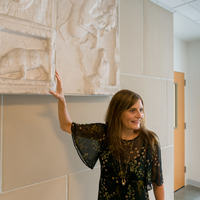Papers by Gesthimani Seferiadi

This thesis seeks to explore the gendered politics in Sophocles’ Trachiniae. In particular, in th... more This thesis seeks to explore the gendered politics in Sophocles’ Trachiniae. In particular, in the first chapter, I suggest that Deianeira’s Amazonian prehistory introduces from the outset a paradoxical and unstable symbol of similarity and difference that creates tension between masculinity and femininity. Following that, in the second chapter, I discuss the remote and monstrous un-political setting that is defined by disclaimers of marriage and illicit sexualities, namely Herakles and his monstrous competitors (Acheloos, Nessos), in order to argue that this world is juxtaposed to the social sustainability that is ensured through the well-being of the oikos. With an Amazon being placed within the civilized arrangement of an oikos, Trachiniae negotiates the locus of the female and advocates the need to expel the monstrous sexualities from the polis. Within the blurred boundaries of gender distinctions, however, it is striking that the sustainability of the oikos and the polis is pro...

Myth and History: Close Encounters
In this presentation, I discuss the way the end of the play interacts with the authority of ‘hist... more In this presentation, I discuss the way the end of the play interacts with the authority of ‘history’ with a view to exploring the question of whether the relationship between tragic mythos and ‘history’ is imperative and restrictive, namely whether this a kind of authority that restricts the poet’s freedom to depart from the conventional rules of the genre. I also take advantage of the opportunity this discussion offers to consider further interpretative issues that are related to the end of the play and have been appealing to traditional criticism, such as the ‘apotheosis dilemma’ and concerns about dramatic unity and characterization. This analysis allows me to suggest that in the exodus of the play Herakles is being transformed into a kind of deus ex machina or a speaker of aetiology, namely a speaker whose privileged knowledge extends beyond the boundaries of the drama. Through this transformation, the exodus successfully necessitates the settlement of a dramatic order and sets up the closure of the play but nonetheless continues to invest in the scheme of irregularity in terms of ritual and gender roles.

Αυτή η διατριβή επιδιώκει να διερευνήσει τους έμφυλους συσχετισμούς στις Τραχίνιες του Σοφοκλή. Ε... more Αυτή η διατριβή επιδιώκει να διερευνήσει τους έμφυλους συσχετισμούς στις Τραχίνιες του Σοφοκλή. Ειδικότερα, στο πρώτο κεφάλαιο προτείνω ότι η Αμαζονική προϊστορία της Δηιάνειρας εισάγει εκ προοιμίου ένα παράδοξο και ασταθές σύμβολο ομοιότητας και ετερότητας που δημιουργεί ένταση ανάμεσα στην αρρενωπότητα και τη θηλυκότητα. Στη συνέχεια, στο δεύτερο κεφάλαιο, συζητώ το απομακρυσμένο και τερατώδες μη-πολιτικό περιβάλλον που ορίζεται από την αποκήρυξη του γάμου και τις παράνομες σεξουαλικότητες, δηλαδή από τον κόσμο του Ηρακλή και των τερατωδών ανταγωνιστών του (Αχελώος, Νέσσος), προκειμένου να υποστηρίξω ότι ο κόσμος αυτός αντιτίθεται στην κοινωνική βιωσιμότητα που διασφαλίζεται μέσω της ευημερίας του οίκου. Με την τοποθέτηση μιας Αμαζόνας εντός της πολιτικής διάταξης του οίκου, οι Τραχίνιες διαπραγματεύονται τον γυναικείο τόπο και υποστηρίζουν την ανάγκη να απελαθούν οι τερατώδεις σεξουαλικότητες από την πόλιν. Εντός των θολών ορίων των διακρίσεων μεταξύ των δύο φύλων, εντούτοις, είν...

The Classical Review
This book offers a selection of papers from the fifth decennial Greek Drama conference held in Va... more This book offers a selection of papers from the fifth decennial Greek Drama conference held in Vancouver (Greek Drama V, 2017), supplementing the series of proceedings from previous conferences (Greek Drama III [2006] and Greek Drama IV [2012]). This is an edition that brings together sixteen essays written from a field of international contributors that examine a range of topics (from the politics of the ancient theatre, to the role of the chorus, to the earliest history of the reception of Aeschylus’ Oresteia), employing various critical methods (anthropological, historical and psychological approaches alongside performance analysis and textual criticism). As the editors note in the preface, the selection represents an emphasis on fragmentary works and on the perception of Athenian drama in antiquity, both in Greece and beyond. However, this is more of a loose intention than a coherent factor that draws together the sixteen papers collected here. The first chapter is a keynote lecture by E. Csapo and P. Wilson, ‘The Politics of Greece’s Theatrical Revolution, c. 500–c. 300 BCE’, that establishes the chronological range of the volume, of the fifth and fourth centuries BC, drawing on the authors’ recently published second volume of ‘A Social and Economic History of the Theatre’ (Theatre beyond Athens [2020]). Aiming to contribute to the question of whether theatre was linked in some way with Athenian and/or democratic culture, it examines the evidence of theatrical tradition in the Greek poleis compared with their political status (democracies, oligarchies and autocracies). Although their conclusion does not challenge what seems to be a strong affiliation between theatre, Athens and democracy, it also pays particular attention to the specifics of time, place and purpose and succeeds in making an important contribution to the critical issue of the politics of Athenian drama. The next fifteen chapters are organised in five sets of three-part thematic sections, the first dealing with Sophocles. In the first paper of the Sophoclean group, ‘Selective Memory and Epic Reminiscence in Sophocles’ Ajax’, S. Murnaghan offers a lucid, well-structured discussion of the multifaceted portrayal of Ajax by Sophocles with respect to the different epic narratives that each of his portraits projects, namely, Ajax’s duel with Hector, the Judgement of the Arms and his departure from Salamis. Even though Ajax’s relation with Homer has been much discussed before, this reading offers a fresh perspective that highlights the complex indebtedness that Sophocles pays to Homer as his mentor. Next, in a study about Philoctetes, K. Mattison, in ‘Elegy and Sophocles’ Philoctetes: a Reflection on Generic Resonance’, suggests a rather hypothetical but well-grounded connection between Sophocles’ drama and the elegies of Archilochos, Tyrtaeus and Solon, on the grounds of thematic relevance with the theme of flight. Her suggestion, however, that the basic premise can be applied to other tragedies as well, has yet to be supported. In the last paper about Sophocles, ‘A Dramaturgy of the Self: Deianira between the Grid and the Couch’, E. Papazoglou attempts to reconcile structuralist and psychological approaches to tragic character by providing an up-to-date and original reading of Trachiniae from the perspective of what the author calls ‘dramaturgy of the self’, namely a definition of the tragic subject as seeking subjectivity via an idiosyncratic ‘I’ rather than collective identity. THE CLASSICAL REVIEW 33
This essay will present the reception of Aristotle’s Poetics by Indian scholars in the light of i... more This essay will present the reception of Aristotle’s Poetics by Indian scholars in the light of its comparison with Bharata’s Nāṭyaśāstra, by placing the issue within the broader framework of post-colonial studies. I will start by providing a short introduction of the reception of the classical antiquity in colonial and post-colonial India and then attempt to demonstrate the difficulties in the comparison of the two texts, in order to argue that in general terms the interpretation of Bharata’s text is subordinated to and influenced by the signification of ‘national identity’, whereas at the same time this interpretation produced a discourse which, despite questioning Aristotle’s domination, it also accepted the intellectual structures on which this domination was based.
Πάτρα, 2014 1 εξής, για λόγους ευκολίας, θα γίνεται αναφορά στον «συγγραφέα» του σανσκριτικού κει... more Πάτρα, 2014 1 εξής, για λόγους ευκολίας, θα γίνεται αναφορά στον «συγγραφέα» του σανσκριτικού κειμένου και όχι σε «πιθανούς συγγραφείς», αν και ο δεύτερος χαρακτηρισμός ανταποκρίνεται περισσότερο στην πραγματικότητα. Η εντός παρενθέσεως αγγλική μετάφραση κάποιων όρων παρατίθεται, όταν κρίνεται σκόπιμο, από την μετάφραση του Ghosh, εκτός αν επισημαίνεται διαφορετικά. Οι τεχνικοί όροι παρατίθενται πάντα με πλάγια στοιχεία από το πρωτότυπο -οι σανσκριτικοί μεταγραμμένοι στο λατινικό αλφάβητο -διότι η μετάφρασή τους είναι συχνά ασαφής ή και αδύνατη.
Research Projects by Gesthimani Seferiadi
Call for Papers by Gesthimani Seferiadi
1st Postgraduate Symposium. University of Patras.
Conference Presentations by Gesthimani Seferiadi
Jocasta Classical Reception Greece – Workshop on Tragedy and World War II 15th December 2015, 2015

MYTHICAL HISTORY & HISTORICAL MYTH: BLURRED BOUNDARIES IN ANTIQUITY Friday 28th June – Monday 1st July 2019 Conference & Cultural Center of the University of Patras, 2019
In this presentation, I discuss the way the end of the play interacts with the authority of ‘hist... more In this presentation, I discuss the way the end of the play interacts with the authority of ‘history’ with a view to exploring the question of whether the relationship between tragic mythos and ‘history’ is imperative and restrictive, namely whether this a kind of authority that restricts the poet’s freedom to depart from the conventional rules of the genre. I also take advantage of the opportunity this discussion offers to consider further interpretative issues that are related to the end of the play and have been appealing to traditional criticism, such as the ‘apotheosis dilemma’ and concerns about dramatic unity and characterization. This analysis allows me to suggest that in the exodus of the play Herakles is being transformed into a kind of deus ex machina or a speaker of aetiology, namely a speaker whose privileged knowledge extends beyond the boundaries of the drama. Through this transformation, the exodus successfully necessitates the settlement of a dramatic order and sets up the closure of the play but nonetheless continues to invest in the scheme of irregularity in terms of ritual and gender roles.
Thesis Chapters by Gesthimani Seferiadi
University o Patras, Greece, 2019
Book Reviews by Gesthimani Seferiadi
Seferiadi, G. (2020). STUDIES OF GREEK DRAMA AND THEATRE - (H.) Marshall, (C.W.) Marshall (edd.) ... more Seferiadi, G. (2020). STUDIES OF GREEK DRAMA AND THEATRE - (H.) Marshall, (C.W.) Marshall (edd.) Greek Drama V. Studies in the Theatre of the Fifth and Fourth Centuries bce. Pp. xx 259, figs, ills, map. London and New York: Bloomsbury Academic, 2020. Cased, £85, US$115. ISBN: 978-1-350-14235-0. The Classical Review, 1-3.
Books by Gesthimani Seferiadi

The fluidity of myth and history in antiquity and the ensuing rapidity with which these notions ... more The fluidity of myth and history in antiquity and the ensuing rapidity with which these notions infiltrated and cross-fertilized one another has repeatedly attracted the scholarly interest. The understanding of myth as a phenomenon imbued with social and historical nuances allows for more than one methodological approaches. Within the wider context of interdisciplinary exchange of ideas, the present volume returns to origins, as it traces and registers the association and interaction between myth and history in various literary genres in Greek and Roman antiquity (i.e. an era when the scientific definitions of and distinctions between myth and history had not yet been perceived as such, let alone fully shaped and implemented), providing original ideas, new interpretations and (re)evaluations of key texts and less well-known passages, close readings, and catholic overviews. The twenty-four chapters of this volume expand from Greek epos to lyric poetry, historiography, dramatic poetry and even beyond, to genres of Roman era and late antiquity. It is the editors’ hope that this volume will appeal to students and academic researchers in the areas of classics, social and political history, archaeology, and even social anthropology.
• new perspectives and interpretations of the interactions between myth and history in Greek and Roman antiquity
• analysis of Greek and Latin texts of cross-generic array
• synchronic and diachronic approach of primary material

Gendered Politics in Sophocles’ Trachiniae, 2022
This is the first book-length examination of the notion of gendered politics in Sophocles’ Trachi... more This is the first book-length examination of the notion of gendered politics in Sophocles’ Trachiniae. Making use of feminist theory and tackling the political nature of the categories of identity, culture and sexuality, Seferiadi brings the interpretation of Sophocles’ play up-to-date with the most recent scholarly developments. She discusses the play in the light of its Amazonian and monstrous background and touches upon topics such as marriage and the exchange of women; reciprocity within a corroded system of gift-exchanges; and the dynamics of female silence and the ‘impaired’ hegemonic masculinity.
Contributing to the topic of rape in the ancient world, this book focuses on sexual violence and the intertwinement of marriage and rape from the perspective of tragedy. With an Amazon being placed within the civilized arrangement of an oikos, the play negotiates the position of the female and advocates the need to expel the monstrous sexualities from the polis. Differing from previous analyses, this study is a reminder that female subjectivity was less foreclosed than is often tacitly assumed.
This book seeks to explore the gendered politics in Sophocles’ Trachiniae. The first chapter, dealing with Deianeira as an Amazon and her monstrous opponents aims to define the background of the dislocation of gender symbols in which the play invests (“An Amazon in Athens: Monsters, Gender and the Polis”). Then, one by one, the next four chapters deal with different aspects of this dislocation; the second chapter offers a discussion of the nuptial narratives of the drama and follows the way the irregular material of Trachiniae is included within a structure that repeatedly refers to marriage but is committed to violating this arrangement (“Three Weddings and a Funeral: Marriage and Sexual Violence”); the third chapter deals with the corroded reciprocal transactions of the play with a view to explain Deianeira’s failure as the inevitable consequence of a general crisis in the network of reciprocities (“Beware of Monsters Bearing Gifts: Exchange and Reciprocity”); the fourth chapter investigates the question of guilt and punishment in terms of Deianeira’s ‘crime’ and the issues of female agency that are raised because of her self-conscious decision to send the poisoned robe to Herakles (“Crime and Punishment: Guilt, Justice and Silence”); the last chapter talks through the issues of authority that are raised in the exodus in order to examine the way the dynamics of negotiation of hegemonic masculinity evolves in the closure of Trachiniae (“Absent in the Exodus: Authority and Masculinity”).











Uploads
Papers by Gesthimani Seferiadi
Research Projects by Gesthimani Seferiadi
Call for Papers by Gesthimani Seferiadi
Conference Presentations by Gesthimani Seferiadi
Thesis Chapters by Gesthimani Seferiadi
Book Reviews by Gesthimani Seferiadi
Books by Gesthimani Seferiadi
• new perspectives and interpretations of the interactions between myth and history in Greek and Roman antiquity
• analysis of Greek and Latin texts of cross-generic array
• synchronic and diachronic approach of primary material
Contributing to the topic of rape in the ancient world, this book focuses on sexual violence and the intertwinement of marriage and rape from the perspective of tragedy. With an Amazon being placed within the civilized arrangement of an oikos, the play negotiates the position of the female and advocates the need to expel the monstrous sexualities from the polis. Differing from previous analyses, this study is a reminder that female subjectivity was less foreclosed than is often tacitly assumed.
This book seeks to explore the gendered politics in Sophocles’ Trachiniae. The first chapter, dealing with Deianeira as an Amazon and her monstrous opponents aims to define the background of the dislocation of gender symbols in which the play invests (“An Amazon in Athens: Monsters, Gender and the Polis”). Then, one by one, the next four chapters deal with different aspects of this dislocation; the second chapter offers a discussion of the nuptial narratives of the drama and follows the way the irregular material of Trachiniae is included within a structure that repeatedly refers to marriage but is committed to violating this arrangement (“Three Weddings and a Funeral: Marriage and Sexual Violence”); the third chapter deals with the corroded reciprocal transactions of the play with a view to explain Deianeira’s failure as the inevitable consequence of a general crisis in the network of reciprocities (“Beware of Monsters Bearing Gifts: Exchange and Reciprocity”); the fourth chapter investigates the question of guilt and punishment in terms of Deianeira’s ‘crime’ and the issues of female agency that are raised because of her self-conscious decision to send the poisoned robe to Herakles (“Crime and Punishment: Guilt, Justice and Silence”); the last chapter talks through the issues of authority that are raised in the exodus in order to examine the way the dynamics of negotiation of hegemonic masculinity evolves in the closure of Trachiniae (“Absent in the Exodus: Authority and Masculinity”).
• new perspectives and interpretations of the interactions between myth and history in Greek and Roman antiquity
• analysis of Greek and Latin texts of cross-generic array
• synchronic and diachronic approach of primary material
Contributing to the topic of rape in the ancient world, this book focuses on sexual violence and the intertwinement of marriage and rape from the perspective of tragedy. With an Amazon being placed within the civilized arrangement of an oikos, the play negotiates the position of the female and advocates the need to expel the monstrous sexualities from the polis. Differing from previous analyses, this study is a reminder that female subjectivity was less foreclosed than is often tacitly assumed.
This book seeks to explore the gendered politics in Sophocles’ Trachiniae. The first chapter, dealing with Deianeira as an Amazon and her monstrous opponents aims to define the background of the dislocation of gender symbols in which the play invests (“An Amazon in Athens: Monsters, Gender and the Polis”). Then, one by one, the next four chapters deal with different aspects of this dislocation; the second chapter offers a discussion of the nuptial narratives of the drama and follows the way the irregular material of Trachiniae is included within a structure that repeatedly refers to marriage but is committed to violating this arrangement (“Three Weddings and a Funeral: Marriage and Sexual Violence”); the third chapter deals with the corroded reciprocal transactions of the play with a view to explain Deianeira’s failure as the inevitable consequence of a general crisis in the network of reciprocities (“Beware of Monsters Bearing Gifts: Exchange and Reciprocity”); the fourth chapter investigates the question of guilt and punishment in terms of Deianeira’s ‘crime’ and the issues of female agency that are raised because of her self-conscious decision to send the poisoned robe to Herakles (“Crime and Punishment: Guilt, Justice and Silence”); the last chapter talks through the issues of authority that are raised in the exodus in order to examine the way the dynamics of negotiation of hegemonic masculinity evolves in the closure of Trachiniae (“Absent in the Exodus: Authority and Masculinity”).